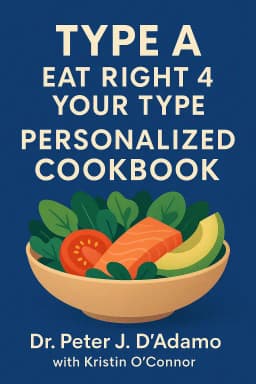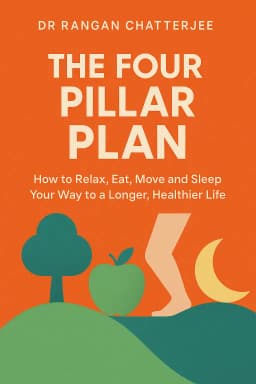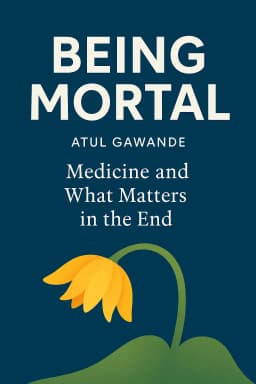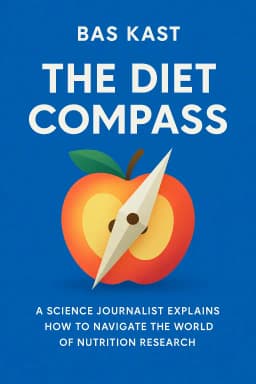
Personalized Podcast
Golden Hook & Introduction
SECTION
Orion: What if I told you the most advanced pharmacy in the world isn't a building, but what’s on your dinner plate? That's the provocative idea at the heart of Dr. Rupy Aujla's book, 'Eat to Beat Illness,' which argues that our plates are often more powerful than pills. It’s a concept that shifts the power of health right back into our own hands.
Orion: Here with me to explore this is eck, a curious and analytical thinker with a passion for nutrition and motivation. Welcome, eck.
eck: Thanks, Orion. It's great to be here. That opening idea is powerful. It reframes health from something passive that happens to you, to something active you can build. That's a huge motivator right there.
Orion: It really is. And today we'll dive deep into this from two powerful perspectives. First, we'll explore how our plates can literally build a better, more focused brain. Then, we'll uncover the hidden story of chronic inflammation—the 'fire within'—and discuss how to tame it. It's really about understanding our body's blueprint.
eck: I love that framing. The body's blueprint. It suggests there's a logic to it, something we can learn and work with, rather than just being at the mercy of it.
Deep Dive into Core Topic 1: Building a Better Brain
SECTION
Orion: Exactly. And let's start with the most complex machine we all own: the brain. Dr. Aujla challenges a deeply ingrained myth: that our brain function just naturally and inevitably declines with age. He introduces this incredible concept of neuroplasticity.
eck: Which is the idea that the brain can change, right? It can rewire itself.
Orion: Precisely. It’s not a static piece of hardware that just wears out. It’s more like a dynamic, living network that can grow new connections and even create new brain cells throughout our lives, in response to what we do and, crucially, what we eat. To understand its power, Dr. Aujla paints a picture of two very different stories, or environments, we can create for our brain.
eck: Okay, I'm listening.
Orion: The first story is the one many of us are living in. It’s called the 'inflammatory Western diet.' This is a diet high in sugar, refined carbohydrates, processed foods, and salt. Dr. Aujla explains that this diet creates a state of constant, low-level irritation in the body. This inflammation can actually disrupt the blood-brain barrier—a protective wall that’s supposed to keep harmful substances out of our brain. When that wall is breached, it's disastrous for brain health. Studies he cites link this dietary pattern to a higher risk of stroke and neurological disorders like dementia.
eck: So it’s like our diet is actively breaking down our brain's defenses. That's a sobering thought. It’s not just about weight or heart health; it’s about the integrity of our minds.
Orion: It is. But then there's the second story, the more hopeful one. This is the story of diets like the Mediterranean diet or, more specifically, what researchers call the MIND diet. This isn't a restrictive fad; it's a pattern of eating. It's rich in things like leafy greens, all kinds of berries, nuts, olive oil, whole grains, and fish. It’s full of color. And the evidence is stunning. Dr. Aujla points to a major study on the MIND diet which found that older adults who followed it most closely had a 53% reduced risk of developing Alzheimer’s disease compared to those who followed it the least.
eck: Fifty-three percent? That's not a marginal improvement. That's a game-changer. That's more effective than any drug we have for Alzheimer's, isn't it?
Orion: By a huge margin. And even moderate adherence to the diet showed a 35% reduced risk. It’s a powerful testament to the idea of neuroplasticity. You are literally giving your brain the building blocks it needs to protect and repair itself.
eck: It strikes me that it's not just about 'good' or 'bad' foods, but about creating an entire environment for the brain. The Western diet creates a hostile, inflammatory environment, while the MIND diet creates a supportive, protective one. That's a systems-thinking approach to health, which I find really compelling.
Orion: That's a perfect way to put it. A supportive environment.
eck: It also makes you think historically. For thousands of years, human diets were fundamentally 'MIND-like' out of necessity—whole foods, plants, whatever was seasonal. The 'Western diet' is a very recent, very aggressive experiment we're running on ourselves, and our brains are paying the price.
Orion: An aggressive experiment. I love that phrasing. And Dr. Aujla's core message is that we can choose to opt out of that experiment. We can consciously choose the second story for our brains. He quotes, "The acceptance that you ‘naturally’ lose brain function as you age is a myth." That's a call to action.
eck: It completely reframes the conversation around aging. It’s not about inevitable decline; it’s about maintenance and protection. That’s incredibly motivating. It makes you want to go out and buy a carton of blueberries right now.
Orion: Right? It’s not about deprivation, it’s about addition. Adding in the good stuff.
Deep Dive into Core Topic 2: Taming the Fire Within
SECTION
Orion: And opting out of that aggressive experiment is so crucial, because that 'hostile environment' you mentioned, eck, has a name. Dr. Aujla calls it 'meta-inflammation.'
eck: Meta-inflammation. Okay, break that down for me.
Orion: So, we all know about acute inflammation. You sprain your ankle, it gets red, swollen, and hot. That's your immune system rushing to the scene to repair damage. It's a good, necessary, and temporary process. Meta-inflammation, on the other hand, is a chronic, low-grade, simmering fire inside our bodies. It's caused by the constant, small stressors of modern life: the excess sugar in our diet, psychological stress, a sedentary lifestyle, even a lack of quality sleep. This slow burn is what he identifies as the root cause, or at least a major contributor, to so many modern diseases—heart disease, diabetes, depression, and even the neurodegenerative conditions we just talked about.
eck: It’s like a silent saboteur. You don't necessarily feel it day-to-day like a sprained ankle, but it's constantly undermining your health from the inside out.
Orion: Exactly. And to show how we can fight this, Dr. Aujla tells a beautiful story that goes beyond just diet. He talks about the Japanese practice of 'Shinrin Yoku,' which translates to 'forest bathing.'
eck: Forest bathing. I've heard of this. It's essentially just spending mindful time in a forest, right?
Orion: That's it. It’s not about hiking or exercise. It's about simply being in nature, engaging all your senses—the smell of the damp earth, the sound of the wind in the trees, the sight of the sunlight filtering through the leaves. It sounds lovely, but the science is what's truly remarkable. He cites studies from Japan where researchers measured the physiological effects. They found that after just a short time spent forest bathing, participants had measurably lower levels of the stress hormone cortisol and, critically, lower levels of inflammatory proteins in their blood.
eck: Wow. So just by changing your environment, by immersing yourself in nature, you can literally start to put out that internal fire.
Orion: You can. It’s a powerful reminder that medicine isn't just in a pill bottle or even just on a plate. It's in the way we live our lives. The book is full of these connections, showing how diet, lifestyle, and environment all work together.
eck: That's incredible. So the two ideas we've discussed are deeply linked. The inflammatory Western diet fuels the fire of meta-inflammation, and that fire, in turn, damages the brain and disrupts neuroplasticity. But a simple walk in the woods can help put that fire out. It's all part of the same interconnected system.
Orion: You've nailed it. That's the holistic perspective the book champions.
eck: It makes me wonder, though. If this concept of meta-inflammation is so foundational, why isn't this the first conversation we have in a doctor's office? It feels like our medical system is so often focused on the smoke—the symptoms, like high blood pressure or high cholesterol—instead of the fire itself. This feels like a paradigm shift that's just waiting to happen.
Orion: Dr. Aujla would agree completely. He argues that's exactly the shift we need in medicine. He has this fantastic quote: "By approaching disease with a holistic perspective, of which food is a vital part, we can tackle the root causes of disease and help our patients truly live well." It’s about moving from just managing symptoms to cultivating genuine wellness.
eck: And it connects back to history, in a way. Figures like George Washington, for instance, suffered from a host of illnesses throughout his life, from smallpox to dysentery to pneumonia. While those were infectious, you have to wonder how the immense stress of his life—leading an army, founding a nation—contributed to a state of chronic inflammation that made him more susceptible. We can't know, of course, but it's an interesting lens through which to view history. We often separate the mind and body, but this suggests they are in constant, dynamic conversation.
Orion: That's a fascinating connection. The idea that the 'body politic' and the physical body are intertwined through the mechanism of stress and inflammation. It really underscores how universal these principles are.
Synthesis & Takeaways
SECTION
Orion: So, to bring it all together, we've seen that we're not just passive victims of our genetics or the aging process. Dr. Aujla's work shows us that we can be active architects of our own brain health through neuroplasticity, and we can be firefighters against the chronic 'meta-inflammation' that underlies so many modern problems.
eck: It's a profoundly optimistic and empowering message. It’s not about a restrictive, joyless diet. It's about understanding your body's blueprint and making choices that help you build a better internal environment. The motivation comes from understanding that you have that power, that your choices today literally build your brain and body of tomorrow.
Orion: Beautifully said. It’s about empowerment, not restriction. And that's the feeling we want to leave our listeners with. Dr. Aujla's work isn't about a total, intimidating life overhaul tomorrow. It's about starting with one small, positive change.
eck: Because small changes add up. They build momentum.
Orion: Exactly. So the question we'll leave everyone with today is this: What is one colorful, anti-inflammatory food you can add to your plate this week? Just one. Maybe it's a handful of spinach in your eggs, some berries on your oatmeal, or a side of roasted sweet potatoes. Because as the book so powerfully shows, that's where health starts.
eck: A simple, actionable first step. I love it.
Orion: eck, thank you so much for bringing your thoughtful perspective to this. It's been a fantastic conversation.
eck: Thank you, Orion. It was a pleasure to dive into these ideas.









